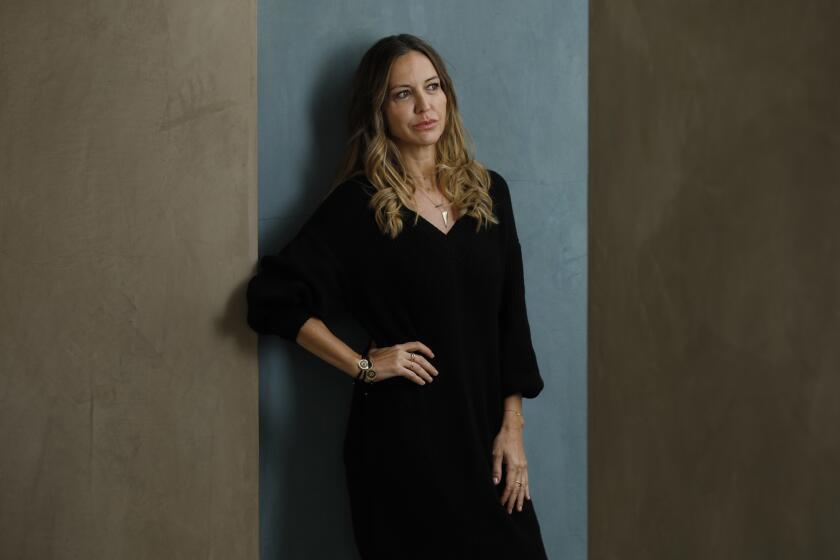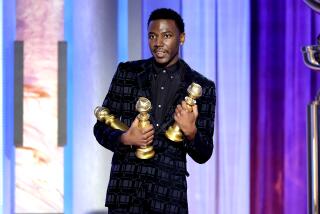Golden Globes fallout: HFPA member says lack of Black members ‘was not really anything we focused on’

- Share via
Two days after a Golden Globes marked by controversy, The Hollywood Foreign Press Assn. continues to face questions over the fact that the 87-member group of international journalists that votes on one of the industry’s most important awards has not had a single Black member in more than 20 years.
In a new interview with the Australian morning show Today conducted after the awards show, Australian HFPA member Jenny Cooney acknowledged that for years the lack of Black members “was not really anything we focused on,” saying that because the group includes people of color from countries such as India, Bangladesh and the Philippines, “we didn’t really consider [the lack of a Black member] a problem.”
“Now, of course, we realize that we should have been much more proactive about really going out of our way to recruit and work with the media, the journalists, the foreign press everywhere,” she said. “And that’s what we’re committed to doing now that we’ve really understood.”
In a recent interview with Variety, former HFPA president Meher Tatna confirmed the organization has not had a Black member in more than 20 years. In 2013, the group rejected a Black applicant, British-based Samantha Ofole-Prince, a decision that was the subject of controversy within the group at the time and has sparked new tensions among members in recent days.
In explaining the absence of any Black members in the group, Cooney said in part that the group has been distracted the past year by “a lot of turmoil” due to the COVID-19 pandemic. She also attempted to pin some responsibility on the Motion Picture Association (formerly known as the Motion Picture Association of America, or MPAA), which compiles a press list for studios of accredited entertainment journalists that the HFPA relies upon as part of its application process. Under the HFPA’s rules, in addition to submitting clips and securing two sponsors, applicants must have been listed in the MPAA’s directory of journalists for the past two years.
Capping a week of mounting controversy over its membership and ethics, the Hollywood Foreign Press Assn. held its 78th Golden Globe Awards.
“Keep in mind, the members of the HFPA have to be vetted first by the Motion Picture Association — it was a way of us making sure that all of our members were legitimately journalists — and the MPAA did not have a Black member in their international directory at all,” she said. “Not to throw them under the bus, but that was the pool that we were choosing from, and we’ve now realized that we can’t rely on the studios, we can’t rely on anybody else.”
According to a source familiar with the MPA’s procedures, the MPA is not involved in any way with the HFPA’s membership decisions beyond providing access to their media directory. The group’s list of accredited press has some 200 journalists on it, and the MPA does not ask applicants about their race or ethnicity.
Ofole-Prince was first accredited by the MPA in 2011 and is still currently listed in the group’s directory.
In the interview, one of the show’s presenters pressed Cooney, “I don’t know how you didn’t know that there was a problem. Is it because you’re white?”
“I always thought diversity was more about not skin color but about nationalities and where people came from,” Cooney said. “And also, because we were writing for foreign publications, I never understood that ... we had to go and find a Black person. It sounded very strange to me. But we always welcomed everybody, and if somebody had applied we would have welcomed them with open arms.”
A brief onstage pledge to change by three HFPA members during Sunday’s Golden Globes did not impress critics of the organization, including Time’s Up.
Cooney said that she was “kind of mortified” that the group had a blind spot around the lack of Black members.
“We’ve always been incredible supporters of culture around the world, we’re the first ones to find the new movie and the new artists from somewhere else,” Cooney said. “We’ve always sort of championed them, but we never really put the microscope on ourselves, and it is embarrassing. And it is kind of alarming that we could have gone so long.”
Leading up to Sunday’s Globes, after a Times investigation highlighted the group’s lack of Black members, many prominent figures in Hollywood, including “Selma” director Ava DuVernay, TV producer Shonda Rhimes, actors Jennifer Aniston, Sterling K. Brown, Ellen Pompeo, Mark Ruffalo, Kerry Washington and others blasted the HFPA on social media with the hashtag #TIMESUPGlobes.
The controversy was front and center at the show, with co-hosts Tina Fey and Amy Poehler faulting the HFPA for its lack of Black members in their opening monologue and referencing widespread criticism that none of this year’s acclaimed Black-led awards contenders, including “Ma Rainey’s Black Bottom” and “One Night in Miami...,” earned best picture nods. “Everybody is understandably upset at the HFPA and their choices,” said Poehler. “Look, a lot of flashy garbage got nominated but that happens. That’s like their thing, but a number of Black actors and Black-led projects were overlooked.”
Three leaders of the HFPA — Tatna, vice president Helen Hoehne and current president Ali Sar — took the stage to vow to add Black members. But the speeches, which totaled less than 50 seconds, were lacking in any specifics on how that would come about.
The Golden Globes were engulfed in controversy. You would never have known that if you watched the show. How will the Oscars react?
Just minutes after the show ended, Time’s Up President and CEO Tina Tchen sent letters to the HFPA and NBC, decrying the group’s response as “cosmetic” and calling for further reforms.
In the interview, Cooney said that the HFPA is “having a dialogue right now with Time’s Up” and other organizations. “We’re counting on our partners to say we can’t fix this alone, because we’ve been looking at this from the wrong filter,” she said. “So we need you to help us find people and bring them in as soon as possible ... I really feel like this time next year, we’ll have, I would have to think, at least three or four Black members.”
A representative for Time’s Up said Wednesday that the group has not yet heard from the HFPA. The group also disputed Cooney’s claim that the HFPA has “given a lot of money to Time’s Up” and other organizations supporting Black journalists, writing in a tweet Wednesday, “We have no record of any donations from HFPA to TIME’S UP.”
On Wednesday, the National Association of Black Journalists, the largest media organization for people of color, announced that it had set up a meeting with the HFPA to help the group rectify the lack of Black members in its ranks. “NABJ demands from HFPA that the omission never happen again and believes it’s imperative that HFPA has severe contractual financial implications for such egregious behavior, no matter which broadcast media outlet it partners with, to ensure it never happens again,” the group wrote in a statement.
The HFPA has not responded for comment to the Time’s Up letter and criticisms of their handling of the issue. Responding to previous questions, a spokesperson noted more than 35% of the group’s membership is from non-European countries, which Cooney repeats in the interview. That would leave the percentage of European membership in the HFPA at around 65%. Three members are American.
The organization said the perception that many members are not serious journalists is “outdated and unfair” and that it is committed to addressing the lack of Black members.
More to Read
Only good movies
Get the Indie Focus newsletter, Mark Olsen's weekly guide to the world of cinema.
You may occasionally receive promotional content from the Los Angeles Times.









